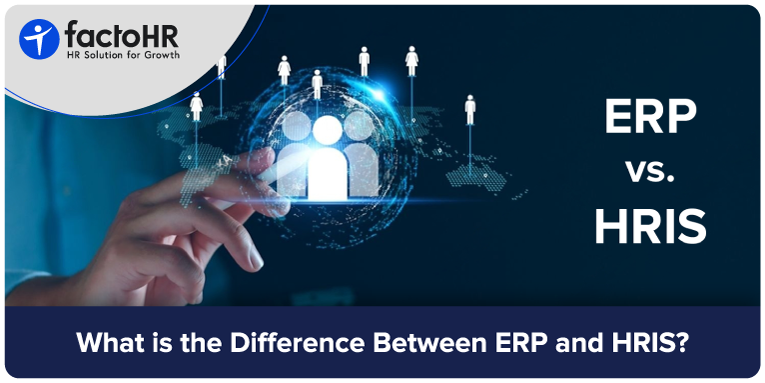ERP vs HRIS: What is the Difference?

Table of Contents
Feeling a bit puzzled about the difference between Enterprise Resource Planning (ERP) and Human Resource Information System (HRIS)? While they might seem alike, they play unique roles in enhancing organizational efficiency. In today’s fast-paced business world, companies leverage diverse software solutions to optimize their HR processes. These tools are vital for managing business and HR operations, ultimately fueling growth and success. Let’s explore how ERP and HRIS can help your organization thrive!
Organizations need to know that ERP and HRIS serve different purposes. This article explains the differences between Enterprise Resource Planning (ERP) and Human Resource Information Systems (HRIS) and will also guide you in choosing the best system for your needs, whether ERP or HRIS.
ERP software manages and integrates key business processes. Many organizations use this software to connect different departments and functions, such as finance and human resources. It helps organize workflows and provides analytics on business performance to make informed decisions.
An HRIS software is a type of software that manages and stores employee information in a centralized platform. This includes HR and payroll-related data. The software automates all the primary HR processes from hiring to offboarding.

What is the Difference between ERP and HRIS?
After understanding the meaning of ERP and HRIS, let’s examine how these software programs differ from one another. Some of the core differences are mentioned below.
- ERP integrates each and every aspect of a business, whereas an HRIS is designed to manage employee data. It simplifies all HR processes, like recruitment and attendance management.
- ERP serves the entire organization and every department, designed to encompass all facets of the company. A cloud-based HRIS only focuses on the HR department and its requirements. ERP is a broad term that includes HRIS as a component of its software suite.
- ERP software is designed to improve HR processes and each department in the company. ERP software vendors have to consider the various needs of multiple departments, including HR needs. The HRIS platform offers features that enhance various aspects of the HR department. These features are customized according to the organization’s needs and requirements.
- The ERP system has a single database for all the important business processes. This data is shared among different departments according to their requirements. HRIS software manages employee information and other HR-related data, which are typically handled by HR professionals. HR teams have authorized access to an HRIS, and some other personnel have limited access only.
- Implementing an ERP solution can be challenging, as improper software management may fail. An HRIS system is an affordable option which affects only a few departments if the software fails.
- When it comes to ERP, the HR department’s needs are rarely fulfilled, as it also focuses on other departments in an organization. An HRIS software is a better option for HR teams to manage employee data and be more specific in that area.
- ERP systems are not people-oriented. Meanwhile, an HRIS solution is more people-specific.
ERP vs HRIS: Understanding the Key Difference
| Software Type | Enterprise Resource Planning (ERP) | Human Resource Information System (HRIS) |
|---|---|---|
| Focus | Includes all the aspects of a business | Only includes managing HR operations |
| Data | Integrates all the business data, which also includes HR data | Focuses on HR processes and data |
| Integration | Integrates various business processes and departments | Integrates HR-related data and functions. |
| Users | A lot of employees use the software from manufacturing to finance | HR professionals use the software, and other employees have limited access |
| Capabilities | Includes all tasks related to the business and some of the HR department | Includes HR functions and is specific to that department only |
| HR functionality | Includes basic HR and payroll-related modules | Includes advanced HR features |
| Implementation | Complex and time-consuming | Easy and less difficult |
| Personalization | Generalized and less range of HR needs | Specific to HR needs |
| Best for | Large enterprises which need business management in a single platform | Organizations who need powerful management in the HR department |
| Cost | High cost due to a broad range of functionalities | Low cost due to less complexity and fewer modules than ERP |
| Scope |
|
|

Which One Should You Choose? ERP or HRIS?
When choosing between the two software solutions, ERP and HRIS, an organization should know its business requirements and size. These requirements can be complex for large organizations, as each department has multiple needs. ERP systems have a wide range of functionalities, including HR-related processes. HRIS systems only include HRM functions.
ERP systems manage business activities like finance and sales management. The aim of ERP software is to unify different departments and functions to simplify workflows. When data sharing is centralized, some complex business processes can be made simple. This is mainly for large enterprises with complex functionalities.
An HRIS (Human Resource Information System) focuses on managing employee information and HR processes. Key features include payroll and performance management, which can be tailored to fit an organization’s needs. The system can work with ERP software or be used on its own.
An HRIS solution is a better alternative for businesses and HR professionals, as it can manage HR functionalities. It is a specialized system for managing medium-sized businesses’ HR tasks. Recruitment and other HR-related tasks can be improved efficiently. The system is easy to implement, and providing training sessions makes navigation simple. It is a cost-effective and efficient option when compared to ERP software.

Conclusion
ERP software benefits overall business integration, but an HRIS is a better choice for managing HR-related tasks. An HRIS system’s features include customized features and efficiency in HR processes. This also completely depends on the business requirements and its size. Combining both can also benefit an organization, as some of the specialized HR functions are integrated with overall business operations.
factoHR can simplify and manage HR tasks. It can transform various modules, starting from recruitment to offboarding. This helps increase the effectiveness of the core HR-related processes and positions the organization for long-term success.
Grow your business with factoHR today
Focus on the significant decision-making tasks, transfer all your common repetitive HR tasks to factoHR and see the things falling into their place.

© 2026 Copyright factoHR


